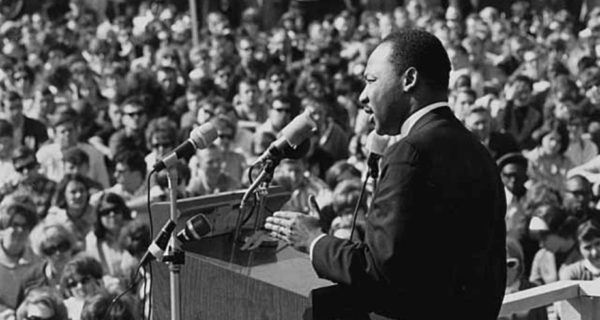“I have a dream that on the red hills of Georgia,
sons of former slave owners will be able to sit down
together at the table of brotherhood.
I have a dream that, one day, even the state of Mississippi,
a desert state, sweltering with the heat of injustice, sweltering
with the heat of oppression, will be transformed into an oasis
of freedom and justice.
I have a dream that my four little children will one day live in a
nation where they will not be judged by the color of their skin
but by the content of their character.
I have a dream.”
Martin Luther King Jr. spoke these, now famous, words at the Lincoln Memorial on August 28, 1963 during the March on Washington. The 1960s was a decade of great social unrest that saw the assassinations of John F. Kennedy, Robert Kennedy, and on April 4, 1968, King himself. America’s military involvement in Vietnam grew more unpopular as the decade neared its end and it appeared to many Americans as if the war would not end. Along with the conflict in Vietnam, the issue that most threatened to tear the fabric of the country apart was that of civil rights.
One hundred years had passed since Abraham Lincoln had delivered the Emancipation Proclamation at Gettysburg in 1863, and black Americans were only slightly better off than they had been a century earlier when Lincoln ruled slavery as unconstitutional. Blacks were all too often considered inferior to whites, especially in southern states. Many schools remained segregated, blacks were not welcome in restaurants that catered to white folks and were not permitted to drink from the same fountains as whites. Black Americans were too often treated as second rate Americans. By the mid-1950s, black Americans had had enough and were ready to fight for their constitutional right that all men are created equal.
Martin Luther King Jr. was certainly not the only person fighting for equal rights, but was certainly one of the most vocal. His “I Have a Dream” is one of the most famous and heartfelt pleas for equality ever delivered. It’s a moment in time that America is still attempting to live up to. Black Americans are no longer forced to eat and drink separately from whites, schools are no longer segregated and a man of color, Barak Obama, has been one of our greatest leaders. However, blacks are still by too many considered inferior to whites, just as many wrongly consider women inferior to men, women’s liberation being the other major issue in the civil rights movement of the 1960s. On both fronts, America has a long way to go. Martin Luther King Jr.’s dream of all humans living peacefully, as one, is one still left unfulfilled.
Martin was born Michael Luther King Jr. on January 15, 1929 in Atlanta, Georgia. Four years later Michael Luther King Sr. changed his and his son’s names to Martin in honor of the great theologian, Martin Luther.
At an early age, young Martin had been more interested in the law and medicine than following in the steps of his father, a Baptist minister. He later realized that the ministry offered him a far better opportunity to spread his belief in equality among all Americans than he could find as a lawyer or medical doctor. Martin Jr. delivered his first sermon in 1947 at Ebenezer Baptist Church in Atlanta.
There is no social movement that can really be attributed to one specific event, but if the fight for civil rights for black Americans had to be narrowed down to one incident, it would be the fateful day of December 1, 1955 when 42-year-old Rosa Parks was arrested in Montgomery, Alabama, after she refused to give up her seat on the bus to a white man. Ms. Parks’ arrest was an event in history like the Boston Tea Party, where angry colonists dressed as American Indians boarded an English ship, and tossed all the chests of tea into the bay, marking the beginning of the 13 colonies’ eventual split from England. Once it transpired, there was no going back.
A month after Rosa Parks’ arrest, Martin Luther King Jr.’s home was bombed after a speech he gave at First Baptist Church. What separated King from many revolutionaries was his belief in nonviolent protests, believing that using violence to fight violence was never the answer. It’s a sad irony that King himself would be the target of so much violence in his lifetime.
King was also a man who practiced what he preached. He was arrested fourteen times, fighting for what he believed in, first on October 19, 1960 when he participated in a sit-in at a lunch counter in Atlanta. King was arrested during another sit-in on April 12, 1963, just eight days after his speech at the Lincoln Memorial.
King and other civil rights activists began to have some effect on the United States government. On May 6, 1960, President Eisenhower signed the Civil Rights Act of 1960, protecting a black person’s right to vote. This came three years after Little Rock, Arkansas allowed nine black teenagers to attend what had been the all-white Little Rock Central High School. On April 11, 1968, President Lyndon Johnson signed the Civil Rights Acts of 1968, making housing discrimination illegal.
Sadly, the Civil Rights Acts of 1968 came seven days too late for Martin to see, as on April 4th King was assassinated by James Earl Ray on the balcony outside his room at the Lorraine Motel in Memphis. A tragic ending for anyone, but especially so for a peace-loving man of God who preached non-violent protests.
It’s been fifty-five years since Martin Luther King Jr. delivered his famous “I Have a Dream Speech” in Washington, and the dream has yet to come to pass. Since King’s death in 1968, America has made small strides in equality but still has a long road ahead.
